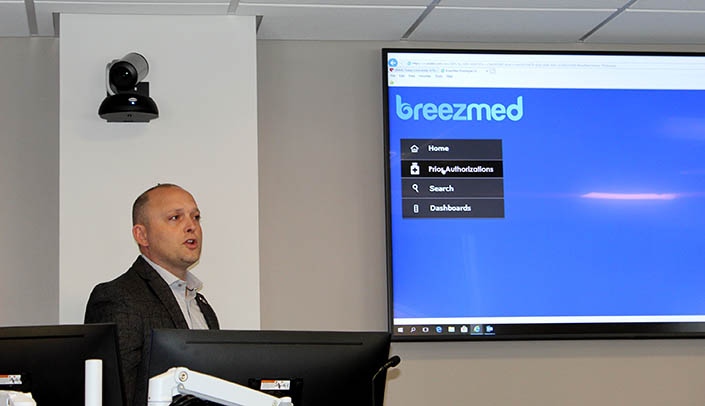Stephen Salzbrenner, M.D., wants to make getting prescriptions a lot easier and quicker.
An assistant professor in the UNMC Department of Psychiatry, Dr. Salzbrenner, with help from health software company H4 Technology, created Breezmed, a program which solves many of the problems patients deal with when it comes to prior authorizations.
For those who aren’t familiar with that term, it is a process insurance companies use to make sure doctors and other providers are practicing safe prescribing habits. The downside is that the current process is time consuming and burdensome for nurses and prescribers, such as doctors, physician assistants and nurse practitioners.
“It’s called Breezmed because I want it to be a breeze,” Dr. Salzbrenner said. “I want doctors to enjoy their job, kick up their feet, sip some coffee and know there’s a solution out there.”
Dr. Salzbrenner has worked on Breezmed for almost three years and borrowed $75,000 to get the project off the ground. Last month, the Nebraska Department of Economic Development approved a prototype grant for $75,000 to assist Breezmed, LLC with the development of a software tool to automate and improve medication selection and prior authorization. The grant could increase to $150,000 if additional research and development are needed.
The goal of Breezmed is to speed up the process of getting insurance providers to approve prescriptions.
“When I prescribe a medicine, it’s common now for the patient to go to the pharmacy, but not receive their medicine right away. Instead, they get sent back home,” Dr. Salzbrenner said. “Then the pharmacy talks to the insurance company. The insurance company sends us paperwork or an electronic form to complete.
“I usually have a stack of papers and several emails waiting for me. We have to fill out the paperwork or forms and then send it back to the insurance company. Then, the insurance company lets the pharmacy know that the medication is approved; the pharmacy calls the patient to let them know to come back to the pharmacy to get the medicine, and then the patient has to make another trip to the pharmacy to get the medication. It’s a big mess.”
If a patient arrives at a pharmacy and hears that his/her insurance provider has not approved the treatment, many patients won’t come back. The American Medical Association (AMA) says 22 percent of patients abandon treatment, due to prior authorization issues.
“This is a huge public health issue because people are sick when they could be on medication and getting better,” Dr. Salzbrenner said. “Breezmed aims to be proactive and streamline the process through automation. Ultimately, the goal is to have the medication authorized by insurance the first time the patient arrives at the pharmacy, which will lower the number of medication abandonment cases.”
Prior authorization forms also cause problems for the providers. In a 2018 survey, the AMA said doctors or their staff spent between one and two working days each week completing prior authorization forms, and 36 percent of clinics have staff whose sole job is to work on prior authorization forms. Dr. Salzbrenner said he would like to roll out the software in the area of behavioral health first since that is his clinical specialty.
“We will attack one diagnosis at a time and one insurer at a time, like ADHD for Medicaid,” he said. “Then, we can move on to depression for Medicaid, schizophrenia for Medicaid, and so forth.”
Dr. Salzbrenner welcomes any feedback on the prior authorization process so that he can address current issues of concern within the UNMC/Nebraska Medicine community. Please email him at stephen.salzbrenner@unmc.edu.

So cool. And so needed.
Good work Steve! Nice to see a MOQ alum doing good work at UNMC!
Addressing clinical inefficiencies as you are doing is an important wellness initiative – thanks for doing this, Steve.
You never cease to amaze with your humble and pragmatic approach to helping others